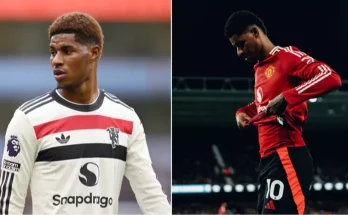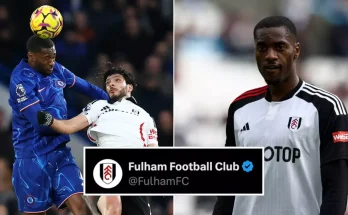Welcome to The Briefing, a column where, every Monday during this season, The Athletic will discuss three of the biggest questions to arise from the weekend’s Premier League football.
This was the round when the final Merseyside derby at Goodison Park in the league (and potentially last ever) was postponed because of the weather, Manchester City and Arsenal dropped points again, Brentford continued their brilliant record at home and Nottingham Forest won away to Manchester United for the first time in 30 years.
Here, we will ask whether Chelsea are genuine title challengers, what impact Dan Ashworth’s swift departure will have on United, and whether it’s ever a good idea for a struggling manager to pick a fight with the club’s fans…
How realistic is Chelsea’s title challenge?
Brentford at home. Everton away. Fulham at home. Ipswich away. Crystal Palace away. Bournemouth at home. Wolves at home.
Those are Chelsea’s next seven Premier League fixtures before they travel to face Manchester City on January 25. A few tricky games for sure and you’d expect them to drop points here and there, but with limited distractions (no more Carabao Cup as they’re out, Morecambe (currently second-bottom of the entire EFL) at home in the FA Cup, and two more matches in the Conference League, where they’re well on the way to qualifying so can rotate heavily), it’s a pretty good run at what is usually one of the most frantic times of the season.
Chelsea are four points behind leaders Liverpool, having played a game more than them. At a time when the other challengers are showing real fragility — Arsenal drawing away to Fulham and Manchester City dropping points at Crystal Palace this weekend — they are pretty consistent. At the very least, much more consistent than we thought they would be.
They’ve won their last four league games and have only been beaten this season by Liverpool and a pre-existential crisis City. Maybe the most encouraging thing is how Chelsea have been winning in a variety of ways recently: some relatively serene (Leicester), some where they’ve blown the opposition away (Southampton), some where they’ve ground it out (Newcastle) and, on Sunday, one where they’ve come from behind (Tottenham).

Chelsea coach Enzo Maresca celebrates Sunday’s win (Shaun Botterill/Getty Images)
They have an array of attacking talent, not least the majestic Cole Palmer (side note: did anyone else laugh out loud at his Panenka against Spurs?), Moises Caicedo is looking great, Nicolas Jackson is scoring goals, even Enzo Fernandez is playing better.
The doubts come at the back. Nobody is really convinced by Robert Sanchez in goal. Central defence is a potential concern. Reece James can’t stay fit. Will those defensive issues stop a concerted title challenge?
Maybe. Probably, even. But for the moment, that’s almost not important.
There’s a rare feeling at Chelsea of progress, that they actually might be taking steps forward without some inevitable backward ones coming soon.
What does Dan Ashworth’s departure mean for Manchester United?
It’s not ideal when you lose 3-2 at home to a team with much more modest resources on a Saturday evening and your weekend only gets more farcical from there.
Manchester United’s defeat to Nottingham Forest was surprising, though not nearly as surprising as it probably should be given the two sides’ respective ambitions and expectations. But the fun was only just beginning, as shortly after the game, the decision-makers at Old Trafford concluded that Dan Ashworth, the sporting director they spent six months trying to recruit and delayed their work in rebuilding the club by waiting for, was no longer the man for them, only five months after he officially started work.
This is the real issue with new co-owner Sir Jim Ratcliffe’s big economy drive since his INEOS empire took over running the club early this year: if the money you save by making ordinary staff redundant, withdrawing perks from the ones you do keep and charging children £66 for a match ticket is just spent on expensive mistakes like this, then what’s the point?
But this sort of confused decision-making, going from Ratcliffe describing Ashworth as “one of the top sporting directors in the world” to being pivotal in the decision to part ways with him a matter of weeks later, only diminishes the confidence that these people know what they’re doing.

Ashworth has left United, which is now part-owned by Ratcliffe (Plumb Images/Leicester City FC via Getty Images)
There are plenty of other questions.
Is this going to set them back even further when they have a squad that needs to be retooled for a new manager? Their PSR (profitability and sustainability rules) concerns were significant before Ruben Amorim replaced Erik ten Hag in that job last month, and this isn’t going to help. Should a sporting director have this much power? Do United even need one of those? If the answer to that is no, then why did they spend months, and £2million to £3m in compensation to Newcastle, trying to hire this one?
And what of Ashworth? Where now? The Athletic reported on Sunday there could be a place for him at Arsenal, but being eased out of your previous position after only five months isn’t going to be a positive entry on anyone’s job history.
Will this diminish the importance of sporting directors across the board? Will clubs think that even the ones with big reputations are sometimes good and sometimes lucky and sometimes are more the products of their environment than individual geniuses who can assemble quality squads at will?
That’s a lot of questions. As usual with United, there are more of them than there are answers.
Did Pep Guardiola and Russell Martin make big mistakes in their post-match interviews?
You wonder if it might be a good idea to give managers an hour or so before they do their post-match interviews.
That’s not going to happen because a) we in the media want instant reaction and b) generally, the managers want to get it over and done with as soon as possible. But with a delay, they would have time to allow the adrenaline to dissipate, their mind to calm down a bit, and the angels of their better nature to drown out the devils.
It might have been a good idea for Pep Guardiola and Russell Martin this weekend.
Firstly, Guardiola and a truly surreal interview with BBC TV, when he was asked about Rico Lewis’ dismissal for two yellow cards against Palace.
“It’s because it’s Rico,” Guardiola said, with a sort of half smile on his face, as if this was the most obvious point in the world. When the, understandably baffled, interviewer asked for clarification, he repeated: “It’s Rico.”
What was he trying to say here? That officials around the country have it in for the tidy, broadly inoffensive Lewis? Or that, inevitably, the tidy, broadly inoffensive Lewis will do something silly to get booked?
Either way, it was a bit odd.
Not nearly as odd as Martin’s post-match interview with BBC radio, when he said of the goal his Southampton side conceded against Aston Villa: “We played out and got pressed just before that, which then makes Joe (Lumley, their goalkeeper) kick and it gets a cheer from the supporters, and we concede within about 10 seconds, so it is what it is.
“They (the fans) have a right to criticise everything else, but it’s really important to understand why we do things. We kick it to our two smallest players and it comes back.”
The reaction from some was to suggest that Martin was blaming the Southampton supporters who travelled to Villa Park for the goal, which might be slightly unfair. But at best, he was rather condescendingly lecturing his own crowd about a way of playing that has their team bottom of the table with only one win from the 15 games so far.

Martin after Southampton’s loss on Saturday (Matt McNulty/Getty Images)
Yes, Martin might be right that there’s a reason Southampton don’t hoof the ball up towards a couple of relatively diminutive strikers, but his way of doing things isn’t going brilliantly either. Southampton have conceded 26 shots and 10 directly from errors this season: both of those figures are the most in the division. They almost conceded another goal against Villa because of an errant short pass from Lumley, who was only their third-choice ’keeper as recently as a month ago.
You might argue that a chosen way of playing which indirectly led to conceding one goal, over another that has directly led to 10, might be worth considering. Martin’s commitment to his style is well-established and he’ll be sacked before he changes it, but acting like it is the only way to play and patronising those who travelled a long way to be at the Villa game, spent a lot of money and greeted a clearance with a bit of joy is, at best, a bad look.
Those Southampton fans have watched 12 defeats this season out of the 15 league matches and are staring instant relegation back to the Championship in the face: it’s best not to compound the misery by treating them like idiots.


